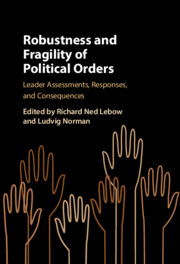Book contents
- Robustness and Fragility of Political Orders
- Robustness and Fragility of Political Orders
- Copyright page
- Contents
- Figures
- Contributors
- 1 Introduction
- 2 Robustness and Fragility of Political Orders
- 3 End of Democracy or Recurrent Conflict: Minimalist Democracy, Legitimacy Crisis, and Political Equality
- 4 Politics and the Administrative State
- 5 Roots in Common: The Fragility–Robustness of Democratic and Ecological Regimes
- 6 The End of Communist Rule in Europe: A Comparative Perspective on the Fragility and Robustness of Regimes
- 7 Democracy’s Fragility and the European Political Order
- 8 The American Fragility–Robustness Nexus
- 9 The Perils of Choice: Structure and Agency in EU Crisis Management
- 10 Conclusions
- Index
6 - The End of Communist Rule in Europe: A Comparative Perspective on the Fragility and Robustness of Regimes
Published online by Cambridge University Press: 25 November 2022
- Robustness and Fragility of Political Orders
- Robustness and Fragility of Political Orders
- Copyright page
- Contents
- Figures
- Contributors
- 1 Introduction
- 2 Robustness and Fragility of Political Orders
- 3 End of Democracy or Recurrent Conflict: Minimalist Democracy, Legitimacy Crisis, and Political Equality
- 4 Politics and the Administrative State
- 5 Roots in Common: The Fragility–Robustness of Democratic and Ecological Regimes
- 6 The End of Communist Rule in Europe: A Comparative Perspective on the Fragility and Robustness of Regimes
- 7 Democracy’s Fragility and the European Political Order
- 8 The American Fragility–Robustness Nexus
- 9 The Perils of Choice: Structure and Agency in EU Crisis Management
- 10 Conclusions
- Index
Summary
Yearnings for political change – dormant for decades, suppressed by coercion and perceptions of unattainability – can suddenly appear realizable with the emergence of new stimuli and facilitating conditions. For a Fourth Wave of Democratization, which ended Communist rule in Europe, the Gorbachev-led fundamental change of the Soviet political system and of Soviet foreign policy was the crucial facilitator. There was a circular flow of influence, which began but did not end in Moscow, in which a liberalization that evolved into democratization in the Soviet Union acted as a stimulus to pressure from below in East-Central Europe. But the attainment of decommunization and national independence in those countries emboldened the most disaffected nations within the Soviet multinational state. The transformation of the Soviet political system was consciously sought by Gorbachev, but the fragility of the state in conditions of political pluralism became evident. The USSR was not in crisis in 1985 but fundamental reform led to crisis by 1990–91. Gorbachev’s embrace of political pluralism plus Yeltsin’s paradoxical demand for Russian independence from the Union led to the Soviet breakup. Even apparently consolidated political orders, America’s included, are potentially fragile, as Trump’s attempted subversion of US democracy, with Republican Congressional backing, has underlined.
Keywords
- Type
- Chapter
- Information
- Robustness and Fragility of Political OrdersLeader Assessments, Responses, and Consequences, pp. 141 - 175Publisher: Cambridge University PressPrint publication year: 2022

